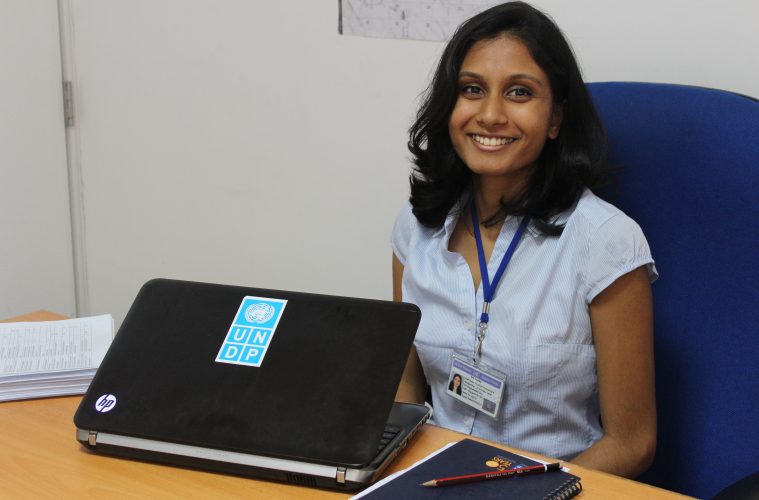Her original goal was to help her country deal with water-related problems. Today, she is a Disaster Risk Reduction Associate at United Nation Volunteers. After completing her Bachelor’s of Environmental Science at the University of Southampton, Nilushi Kumarasinghe (23) from Sri Lanka couldn’t decide whether to continue her studies at Melbourne University or the VU Amsterdam.
You completed a Master’s in Environment & Resource Management at the VU University. What do you find so interesting about the environment? “I come from Sri Lanka, and we have a lot of environmental problems that we aren’t doing a good job at solving. Climate change is often seen as something that will affect us in 20 or 30 years’ time, but in Sri Lanka we’re watching it happen today. For us, it means that the monsoon is weaker than usual, or doesn’t come at all, like last year. Our farmers mainly grow rice, so when too little rain falls, the harvest fails. I’m interested in finding out if we can solve that problem. It’s easy for us in Sri Lanka to say that we should do something to stop climate change, and I think that we should do that, but at the moment it’s more important to ensure that we can adapt, for example by growing crops that are less dependent on ample supplies of water.”
That sounds very Dutch: build dikes, pragmatic solutions, ‘masters of the water’. Is that why you chose to come to the Netherlands for your Master’s? “I did my Bachelor’s in Environmental Science at the University of Southampton. Back in Sri Lanka, I wanted to do a Master’s specialising in water management, because that’s what Sri Lanka needs most at the moment. It’s true that the Netherlands is famous for its water management, but the University of Melbourne had an interesting Master’s programme as well. So I started weighing all of the options.”
‘I wanted to do something that Sri Lanka needs most at the moment’
Why did you choose for the VU University? “What I found most attractive about the VU Amsterdam, is that a obliged part of the curriculum involved doing a project at an NGO. That’s a wonderful opportunity, because it’s often difficult to get a foot in the door as a student. The VU also had a specialisation programme in Water & Climate, but in the end it was the project that made the difference for me.”
What did you think about the VU? “It was fantastic doing a Master’s like this, where dozens of nationalities are all brought together. It was unfortunate that all of the expats all lived in one apartment building, because that presented the risk of separating the students into a group of expats and a group of locals, but in the end it all mixed pretty well. I had to get used to the educational system, where you have different courses every two months. I was accustomed to semesters. That was really intense. It immerses you in the subject, which is a big advantage.”
What stood out most about your time in the Netherlands? Most expats miss the stroopwafels when they leave. “I didn’t really like stroopwafels that much, but I had the best fries I’ve ever eaten in the Netherlands. We have fries here in Colombo, but they don’t compare to the ones in the Netherlands. My best memories are cycling through the streets of Amsterdam with my friends at night and visiting some of my favourite spots such as Brouwerij’ t IJ. We lived in Amstelveen, so it was a long ride. That reminds me: I don’t miss coaster brakes on bicycles. I had to get used to that, just like holding out my hand to signal.
What project did you end up doing? “I ended up at a pilot project by Wetlands International, which wanted to elaborate scenarios for what could happen to the communities of the Inner Niger delta as a result of climate change. What I found most interesting was how we used a new method to sketch out the scenarios. Projects like that allow you to forecast changes to the habitability of such an area.”
‘We try to support communities in Sri Lanka to better adapt to climate change’
Is that also part of your work now? “Yes. Once I got back to Sri Lanka, I started working as a Disaster Risk Reduction Associate at United Nation Volunteers. It’s a fantastic job. We try to support communities in the most vulnerable regions of Sri Lanka to better adapt to climate change, which in our case means prolonged droughts and heavy floods. On the one hand, you could switch to other crops that are less water-intensive than rice, but you could also use water more efficiently. A large component of the project I am currently helping out in is the rehabilitation of large reservoirs to increase water storage for drier periods.
It is fasicnating to know that these reservoirs were built in the era of the kings, more than a 1,000 years ago. Their knowledge about irrigation and water storage was so advanced and well ahead of their time. I have read that when a team of specialists were searching for a suitable location in the dry zone to build a reservoir in the mid 1900s, they even found remains of an ancient reservoir in that exact location they have selected!
This work suits me well. For now, at least. I have a better idea of what I want to do in life. Climate change affects poor people the most: they cannot implement the measures that are sometimes necessary, because they don’t have the resources. I think it’s great to be able to do something about that – to be able to help them adapt to the changes. I think that’s wonderful.”
CONTENTBLOK MOET HIER NOG WORDEN INGEVOERD!!!






